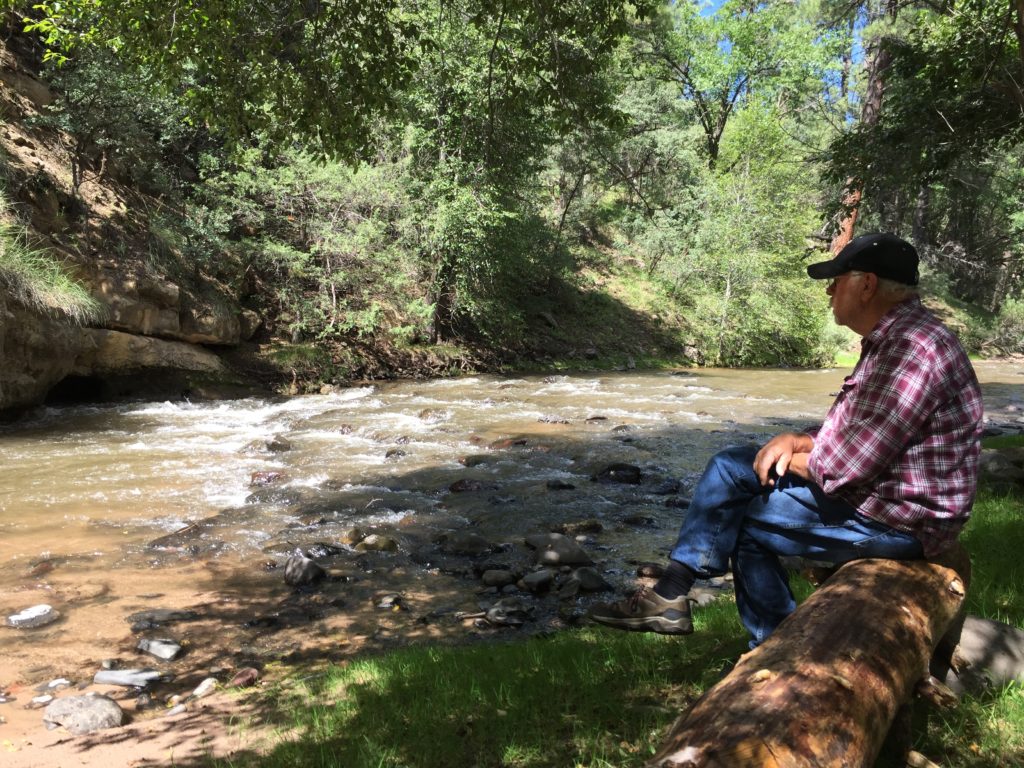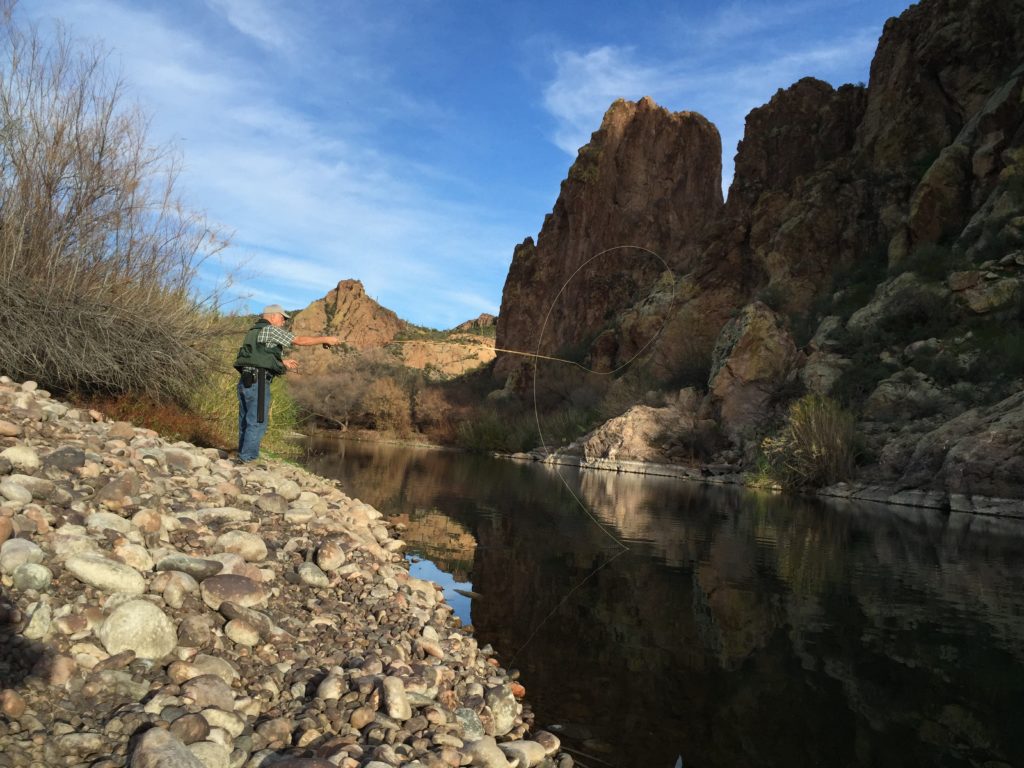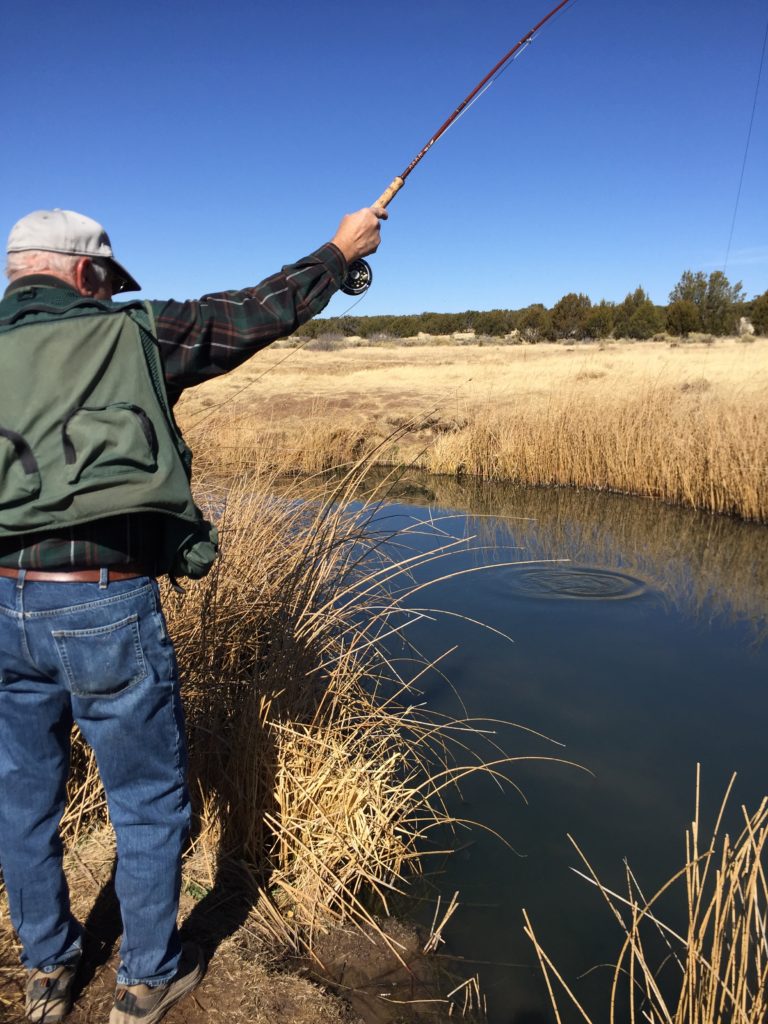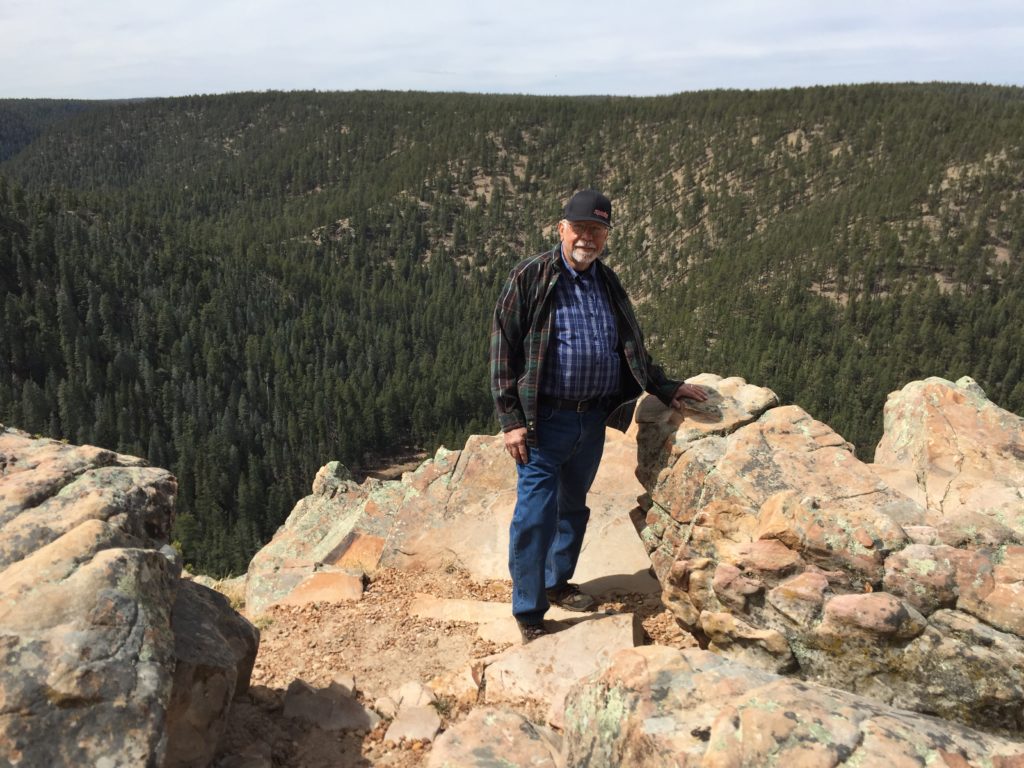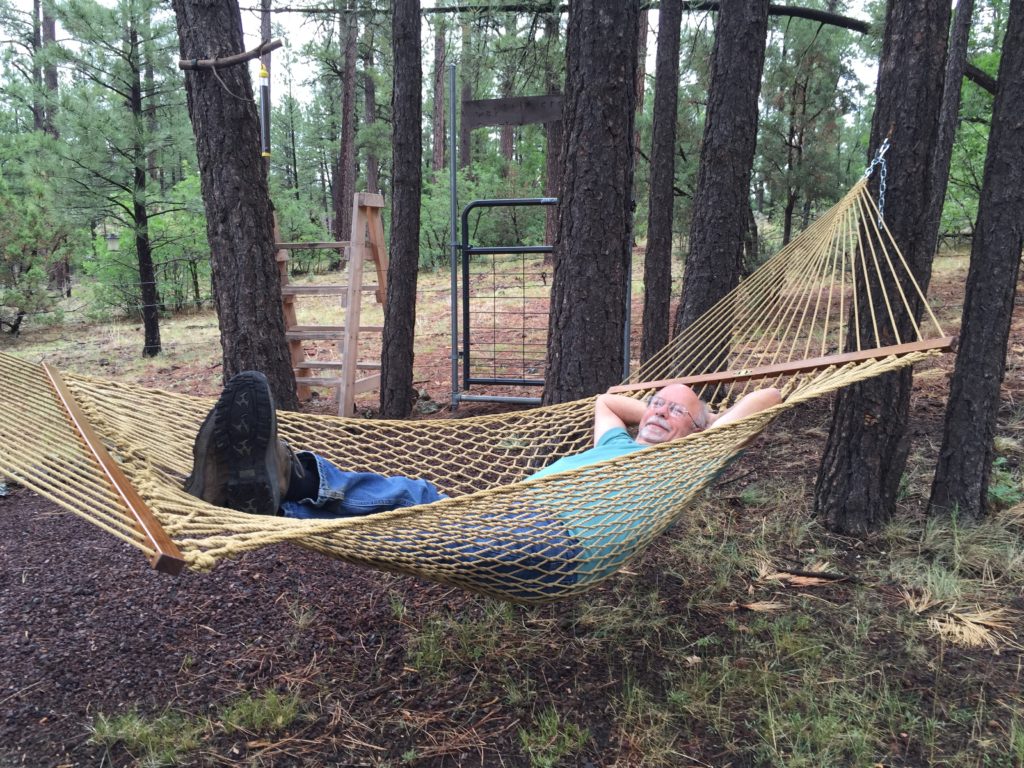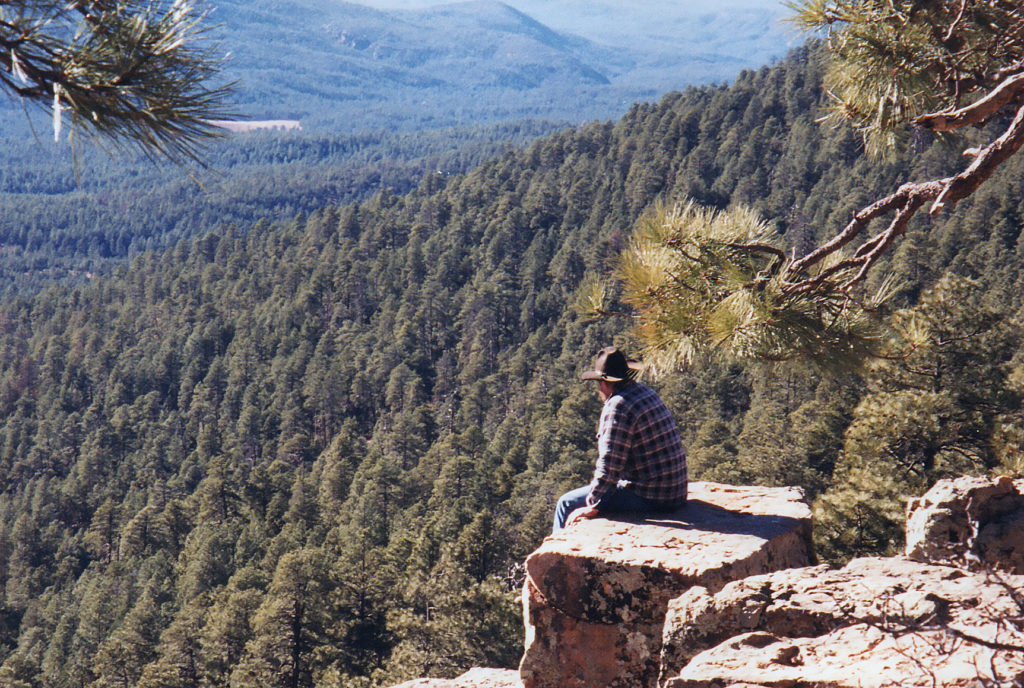The Wagner Boy’s annual camping trip has been held for several years on the Black River on the border Fort Apache and San Carlos Indian Reservations. This area is very rocky, high desert. The main camping area had a lot of shade supplied by cedars, mesquite and some cottonwood trees and was well maintained but had no facilities. The road to the camping area is fairly rough but can be negotiated with passenger cars to a point just before the last camping area. A four wheel drive vehicle was required to get over the last embankment unless you didn’t mind taking a higher speed run at it a time or two. This camping spot has a unique location just above the confluence of the Black and White Rivers which then becomes the Salt River that in turn, runs through the Salt River Canyon. Both of these rivers originate high in the White Mountains. Coming from State Route 79, you pick up the turnoff half way between Cedar Creek and Canyon Day.
Jeff, Phil, Robert, Jim, Nichole, and Jason had arrived the night before we did. They had timed their arrival to be at one minute after midnight so they would not be violating their camping permit. I had to work all day Thursday, so Jeremy headed down Thursday night. We had special instructions from Phil on exactly where to find there camp. I mistranslated the part about coming to a big tree by the road and turned off the main road a little too soon. We found an area a little more primitive than their site but we were the only ones there. Jeremy and I pulled in about 10:00 PM. We towed the canoe trailer with Carol’s Explorer. That last embankment was too difficult to negotiate with the trailer, so our spot was the best spot for us. We pulled up to the edge of the river on a sandy beach. On one side we had a small hill that was solid rock. On the other side we had a stretch of sand, some large shade trees and a rock face of a small mountain. This beach area we were in would best be described as a wash. I’m glade we had a clear weather report.
Most of our camping and fishing gear was stored on the trailer along with two mountain bikes. Our clothes, ice chest and sleeping bags were inside the Explorer. I moved the ice chest to the back of the trailer and checked out the area with the beam of the flashlight. I realized what a great spot this was and we had it all to ourselves.
Sleeping in the back of the Explorer was very comfortable. My Dad, Brother Rick and I used to camp this way many times. It was less hassle than a tent but a little more compact.
I climbed back into the car. Jeremy was all ready in his bag and I was soon in mine. Just as I was dozing off, I felt a little movement in the car. It was more than Jeremy shifting his weight. Then I heard something hit the ground with a thud. I grabbed my flashlight and went out to investigate. At the back of the trailer, I found the ice chest tipped over and laying on its end with the lid ajar and some of its contents and ice lying in the sand. I scooped everything up, sandy ice cubes and all, and put it back on the trailer. I thought I may have left the ice chest hanging too far off of the back of the trailer and the melting ice shifted and unbalancing the load causing the chest to fall off. I didn’t want to lose any ice here in the wilderness and a little sand in the food is kind of a camping tradition, especially if it is windy when you’re cooking. So I got back into the car crawled back in the sack.
As the sun was coming up over the big shade trees, which indicated east, Jeremy was still sleeping. So I quietly got up, dressed and decided to do a little fishing. This water is a little warmer here than its White Mountain tributaries so we found ourselves fishing for small mouth bass instead of trout. I fished for about two hours when I spotted Jeremy stirring around. He loves to sleep in after keeping late hours the night before. I hadn’t set up camp yet and had no breakfast to off er. I ask him what he was hungry for and he said he just wanted something cold to drink. I asked him if he could go for a Dr. Pepper. He said OK so I went to the ice chest, stuck my hand in and pulled out a Dr. Pepper. “Jeremy, Look at this! I shouted. “You weren’t the only one with a thirst for something cold!” The Dr. Pepper can was empty and there were two ó” diameter bear teeth holes on the sides near the top. There were also holes in the lid of the plastic ice chest, were the bear grabbed it with its teeth to pull it off the trailer. We missed the opportunity to f i Im a great Dr. Pepper commercial. A day late and a dollar short.
After a quick day time survey of the area, we decided to set up camp near a large shade tree 25 yards away. We unloaded the canoe and moved our camping rig up the wash to higher, level ground. It was a perfect spot and a great shelter from the afternoon sun.
As we were setting up the campsite, a couple of guys in a relatively new van stopped by and ask if we would mind them camping down by the river. We told them that would be OK. It was nice for them to ask. They actually set up right where we were the night before.
After setting up the camp and having a mid morning snack, we started fishing our way down the river and hopefully find the other Wagner Boys camp. We found the major camp ground a half a block away from us. Had no problem finding their campsite where Jim and Nicole just finished cleaning up the breakfast dishes. The other guys were off hiking somewhere.
A long the river adjacent to the camp ground, there was a long pool of water about thirty foot wide and one hundred feet long. It also had a sandy beach like bank on the camp ground side and a twenty foot shear, solid rock bank on the other side. This would be a great place for the canoe, so Jeremy and I went back up to get it. We could only paddle it short distances at a time and then walked it down through the rapids when the water got to shallow. Once we got it down to the long pool, paddling was great.
After a short while, we were getting a little hungry so we tied up the canoe and hiked up to our camp. We passed the men in the van and noticed that they had pulled one of the seats out of the van and set it right on the river bank. It looked like they were already for some night fishing for catfish.
The next morning, I got up early for some morning fishing before breakfast. I walked down past the van seat and noticed that the night fisherman left the catfish bait, fishing tackle box and various snack foods out on the seat. They were still sleeping and did not know that they had some unexpected company during the night. The bear had helped itself to the snacks, ate the bait, opened the tackle box and threw its contents around, and if that wasn’t bad enough, it ate big chucks out of the van seat and took a big BM right in the middle of it. A hunter or hiker would call that “sign”, I call it poop unless it was my seat, then I would call it xxxx!! I didn’t have the opportunity to see these guys faces when they got up, but I’m sure it was a site to behold.
The rest of the day, Jeremy and I spent fishing and swimming. We caught several small mouth bass on parts of crayfish that we harvested from waters edge. For Dinner that night, Jeremy and I had some Sloppy Joes that Carol prepared for us. With potato chips and pop, we were feasting like Kings. She also sent a freezer bag full of fresh peaches we picked from Snepps Farm in Queen Creek. They were prepared for use as pie filling. We had two graham cracker pie shells and a container of cool whip. We made only one pie for know and the second one we were going to share with the other camp after we cleaned up our camp kitchen. That would take about fifteen minutes because we put a KISS on our cooking. That means Keep It Simple Silly. Well actually it is supposed to be Stupid, but I resemble that statement. I prepared the pie, cool whip and all, and delivered it on my mountain bike along with Styrofoam bowls and spoons. That was a sight worth seeing all by itself because I had to not only ride a good distance up the hill in rough terrain with a lot of loose gravel, but had to control the downward descent into their camp. Almost lost it twice, but the pie was delivered successfully and appreciated by all.
The next morning we were up bright and early. When the sun goes down there isn’t much to do, so you hit -the sack early. Jeremy and I fished, hiked and generally kicked around all day. This is what a short vacation is supposed to be like. A lot of rest and recuperation or as the military calls it R&R.
I decided to fish my way down to the long pool where we left the canoe . As I hit the last rapid, I saw the canoe in the middle of the pool. It was still in the shade cast by the shear cliff and mountain beyond. There was a fishing pole propped up over the edge but the line wasn’t in the water. Phil was lying in the bottom of the canoe with his arm stretched over the edge and dangling in the water while in a deep state of relaxation, just drifting around. The morning breezes were picking up a little and pushed him around just enough to change the scenery but not location. I called out to see if he had a luck fishing there. He said he didn’t want to put his line in the water so he wouldn’t have to be bothered by a fish. He then invited us to join the other camp for steak fry. Phil had brought up the left over steaks from Roberts graduation party. I accepted the invitation.
Jeremy and I had planned to make home made onion rings to share. This would be the perfect opportunity. So that afternoon about 4:30 we started peeling and slicing the large, sweet Vidalia onions, mixing up the special batter and then prepared the large cast iron fry pan for the assembly line frying process. Jeremy would dip the ring in the batter and place them in the pan and I would watch them carefully and turn them at just the right time. We had to taste test a few to make sure we were doing it just right. With ketchup, it was almost a meal in it self. After we finished frying, we had a heaping plate of onion rings. We covered them and grabbed the ketchup and delivered them directly to their camp. This time we took the flatter route by the river and left the bikes behind. We were greeted by some hungry campers. They all had just returned from a long hike down the canyon to fish the lower end of the river. That is where all the big fish are. They catch one very large catfish but release it. They said it was too big to carry out. The onion rings were used as an appetizer and were gone in a short period of time. Jim, their chief camp chef made sure that no onion rings would be wasted.
After the steak dinner, we sat around a shared fishing and bear stories. The bears evidently were equal opportunity menaces. They made sure they gave all the campers sometime to write home about. Phil told us how he would have to lay a frying pan outside of his tent within a hands reach. He took a hammer to bed with him so that when he heard the bears coming near his camp, he would reach out and hit the pan with the hammer to chase the bears away. He did that all night long. In bear lingo, does that clanging mean “go away” or “time for dinnerf” No wonder he was relaxing in the canoe all afternoon.
Sunday morning we had enough time to do a little fishing, swimming and breaking down our campsite. It was a great mini vacation. Just as we were finishing, the boys came by. They hadn’t had lunch and were out of food, so we shared the last of our leftover Sloppy J oes. They weren’t going to be any better than they were right then. They liked our campsite. I could tell by there comments that we would have to beat them to this spot next year. You can’t put dibs on camping spots unless you’re sitting in it.
One year later— There we were, heading to the Black River for the annual Wagner Campout. This time Chad was joining us. We decided to spend the first night at the cabin in Pinetop and then on the way to Black River pick up our permits. The spending the night at the cabin was the best part of the plan. Finding permits was another story. We left the cabin early after a quick breakfast. We stopped in several sporting good stores in Pinetop and Show Low. No permits there. So we headed west on SR 60 thinking we could find a store on the Indian Reservation. Cibecue would be our next stop. Leaving Show Low we were back into the thick ponderosas forest. Suddenly we hear a siren and thinking I should pull over and let the emergency vehicle by, I noticed it was a Highway Patrol Motorcycle. Oh no! I was the emergency. A speeding driver. As the officer came up to the window I already had my drivers license, auto registration and insurance certificate out for his inspection. He asked where I was headed and I told him fishing. He said I was going 57 mph in a 45 MPH zone. I told him thought I was out of the town past that speed limit. He pointed down the road 100 yards to the increased speed limit sign. He told me I almost made it but he was going to just give me a warning. After he wrote the ticket and presented it to me, I told him “Thanks for nothing”. He chuckled and told me to drive safe. I look over at Chad and Jere my. They had a look of astonishment and disbelief that I would say that. So off we go, 45 MPH for another 100 yards then off we go.
We toured the town of Cibecue for about 30 minutes. Couldn’t find any stores open but we always wanted to see what was back there. There is a way to get to the lower end of Canyon Creek from there. We fish the upper end by the Mogollon Rim.
Our next chance to find permits would be in the bottom of the Salt River Canyon and the convenience store run by the San Carlos Tribe. If not there, then we would have to go to Globe where we knew they had them. At the store I ask the clerk if they had fishing permits for the Black River. She said not they did not sell them there. So that was discouraging. We walked outside. Chad was studying a big, engraved wood map of the Salt River Canyon and the San Carol Indian reservation. He pointed out the Black River Crossing; our destination is on their map. I went back into store and told the clerk that the Black River was on there map. She said “Oh, You want a San Carlos Permit! Yes, I do have them.” Boy, if it wasn’t for Chad studying that map we would be have lunch in Globe.
Buy the time we got to the Black River is was 1:00 PM. Worse yet, someone was parked by out favorite tree. Fortunately, they looked like they were just swimming and did not have any camping equipment set up. In a few hours they moved on and we moved in and set up camp. This time we had a tent as there were three of us. Fishing was good, R&R was happening and the food was great! What more could you ask for.
